Here’s What Happened at the 36th UN Human Rights Council
The 36th session of the UN Human Rights Council took place from 11-29 September 2017. Below you will find information on some of the key sexual rights related: Resolutions, Oral Statements, Side Events and Panels.
Featured News
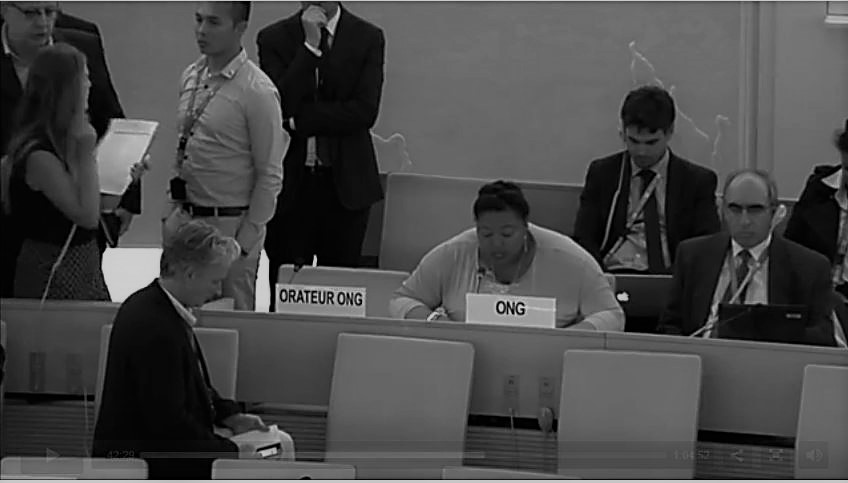
Sexual Rights-related Resolutions
The question of the death penalty HRC/36/L6
Chaired by Benin, Belgium, Costa Rica, France, Mexico, Republic of Moldova, Mongolia, and Switzerland, the resolution focused on the right to equality and non-discrimination in the context of the use of the death penalty as per the Secretary General’s report presented during the session. The resolution condemns the imposition of the death penalty as a sanction for specific forms of conduct, such as apostasy, blasphemy, adultery and consensual same-sex relations, and expressing serious concern that the application of the death penalty for adultery is disproportionately imposed on women. The resolution further deplores the fact that, frequently, poor and economically vulnerable persons and foreign nationals are disproportionately subjected to the death penalty, that laws carrying the death penalty are used against persons exercising their rights to freedom of expression, thought, conscience, religion, and peaceful assembly and association, and that persons belonging to religious or ethnic minorities are disproportionately represented among those sentenced to the death penalty.
The resolution urges States that have not yet abolished the death penalty to ensure that it is not imposed as a sanction for specific forms of conduct such as apostasy, blasphemy, adultery and consensual same-sex relations, calls upon States to undertake further studies to identify the underlying factors that contribute to the substantial racial and ethnic bias in the application of the death penalty, calls upon States to make available disaggregated information on the application of the death penalty and decides that the high-level panel discussion on the topic at the 40th session (March 2019) will address the human rights violations related to the use of the death penalty, in particular with respect to the rights to non- discrimination and equality.
Egypt, Russia and Saudi Arabia put forward 9 hostile amendments to the resolution, including two sovereignty amendments which would have considerably weakened the text. All amendments were rejected.
This is the first UN resolution explicitly referencing adultery at either the Human Rights Council or the General Assembly.
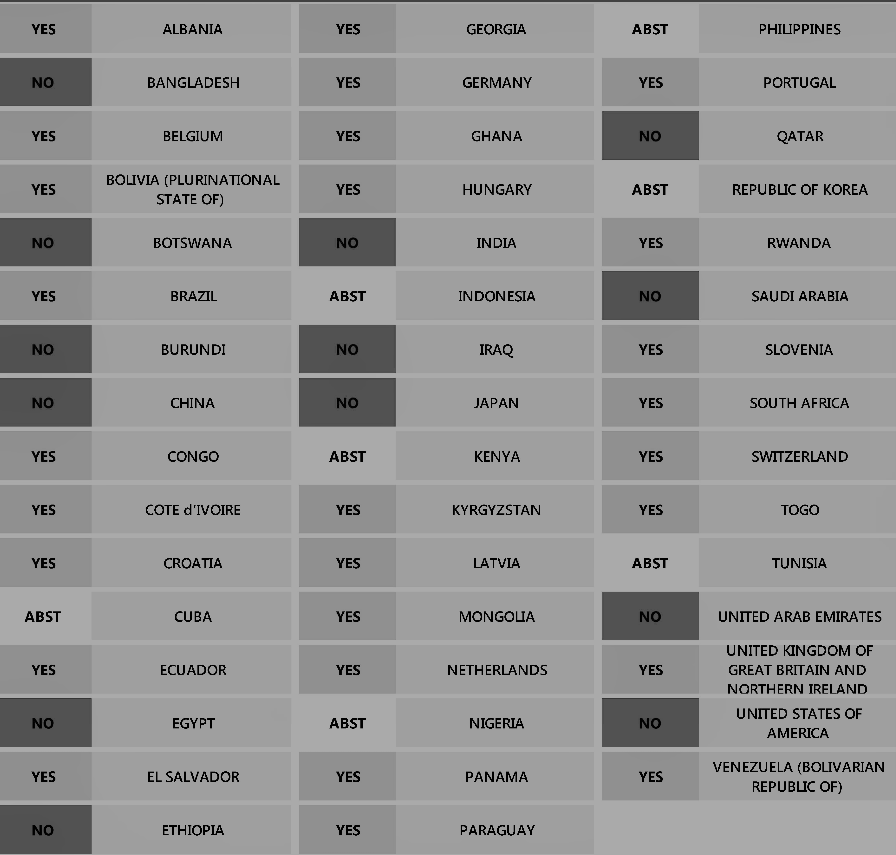
ADOPTED BY VOTE: 27 FOR – 13 AGAINST – 7 ABSTENTIONS
Click here to read the resolution
_______________________________________
The full enjoyment of human rights by all women and girls and the systematic mainstreaming of a gender perspective into the implementation of the 2030 Agenda for Sustainable Development HRC/36/L12
Chaired by the group of Portuguese speaking countries (Portugal, Angola, Guinea-Bissau, Brazil, Cabo Verde, Mozambique and Timor Leste), the resolution recognizes that the full implementation of all Goals and targets of the 2030 Agenda is not possible without the respect, protection and fulfilment of the full enjoyment of human rights and fundamental freedoms by all women and girls, and which should be mainstreamed into all policies and programmes aimed at the implementation of the Sustainable Development Goals.
During the negotiations, a more substantive text that included several paragraphs from Agenda 2030 was discussed. However, many States and civil society objected to the selectivity of issues from Agenda 2030 that were included and the absence of relevant human rights content. In response to these concerns, the core group stripped back the text to make it a largely procedural resolution that calls for a 2-day intersessional expert meeting to consider gaps in, challenges to and best practices in the fulfillment of human rights by all women and girls and the systematic mainstreaming of a gender perspective in the implementation of the 2030 Agenda. A report of meeting will be presented to the Human Rights Council at its thirty-ninth session (Sept 2018).
This resolution has attracted few co-sponsors to date.
ADOPTED BY CONSENSUS WITHOUT A VOTE
Click here to read the resolution
_______________________________________
From rhetoric to reality: a global call for concrete action against racism, racial discrimination, xenophobia and related intolerance HRC/36/L.17/Rev.1
Chaired by the Africa Group, the resolution expresses concern at the increasing incidents of racially motivated hatred in all its forms and manifestations, the resurgent violent manifestations of racism, racial discrimination, xenophobia and related intolerance precipitated by dangerous ideologies, such as white supremacy and extremist nationalist and populist ideologies, and deplores the use of social media platforms to incite hatred and violence against migrants, refugees and asylum seekers, and calls upon States to prohibit by law any advocacy of national, racial or religious hatred that constitutes incitement to discrimination, hostility or violence, including that propagated by information and communications technology. The resolution directs the Ad Hoc Committee on the Elaboration of Complementary Standards to the International Convention on the Elimination of All Forms of Racial Discrimination to commence elaboration of a draft additional protocol to the Convention criminalizing acts of a racist and xenophobic nature.
The USA, stating its concern for the elaboration additional standards to ICERD and limitations to freedom of expression contained in the resolution, called for a vote. Latvia, on behalf of the EU, and Switzerland echoed the concerns of the USA regarding freedom of expression and elaboration of additional standards to ICERD.
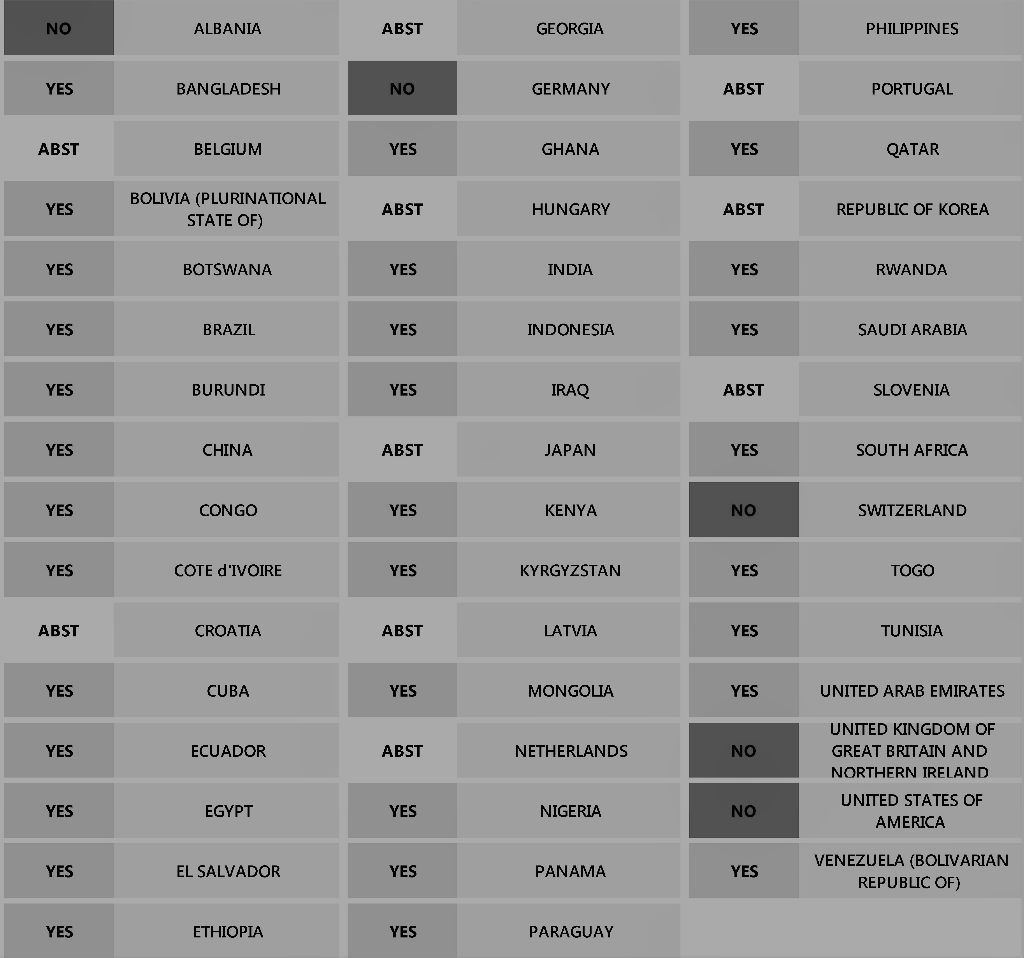
ADOPTED BY VOTE: 32 FOR – 5 AGAINST – 10 ABSTENTIONS
Click here to read the resolution
_______________________________________
Mental Health and Human Rights HRC/36/L25
Chaired by Portugal and Brazil, the resolution expresses concern at the marginalization of mental health within health policies, budgets, in medical education, research and practice, and pays particular attention to the mental health rights of migrants, refugees, women, girls, people living with HIV and members of key populations. The resolution underscores that States should ensure that persons with mental health conditions or psychosocial disabilities have access to a range of support services that are based on respect for human rights in order to live independently, be included in the community, exercise their autonomy and agency, participate meaningfully in and decide upon all matters affecting them and have their dignity respected, on an equal basis with others. The resolution further encourages States to support persons with mental health conditions or psychosocial disabilities to empower themselves in order to know and demand their rights, including through health and human rights literacy, to provide human rights education and training for health workers, police, law enforcement officers, prison staff and other relevant professions, with a special focus on non-discrimination, free and informed consent and respect for the will and preferences of all, and confidentiality and privacy.
The resolution Requests the High Commissioner to organize a consultation during the 71st session of the World Health Assembly, to discuss all the relevant issues and challenges pertaining to the fulfillment of a human rights perspective in mental health.
ADOPTED BY CONSENSUS WITHOUT A VOTE
Click here to read the resolution
_______________________________________
Cooperation with the United Nations, its representatives and mechanisms in the field of human rights HRC36/L26/Rev1
Chaired by Fiji, Ghana, Hungary, Ireland and Uruguay, the resolution notes with concern the worsening incidence, severity and scope of cases of intimidation and reprisals against individuals and groups who cooperate with the United Nations, urges States to refrain from acts of intimidation or reprisals, to prevent such acts and to ensure accountability for such acts. The resolution decides that the presentation of the report of the Secretary-General on cooperation with the United Nations, its representatives and mechanisms in the field of human rights will be followed by an interactive dialogue.
19 amendments to the draft resolution were tabled by Russia, China, Venezuela, Egypt and India, which sought to undermine the role of the UN in addressing reprisals and the responsibility of Governments to stop reprisals, to prevent the publication of reports of reprisals, to assert that some reports of reprisals are fabricated for political purposes and to restrict civil society’s communication with the UN. 1 amendment was withdrawn, 3 were adopted and 15 were rejected. The adopted amendments stress cooperation and dialogue to strengthen the capacity of Member States to comply with their human rights obligations, that information provided by stakeholders, including civil society, should be credible and must be thoroughly checked and corroborated, and changed the language of the tabled text that required States to report on action they have taken to address reprisals to providing concerned States with an appropriate opportunity to respond to allegations.
ADOPTED AS AMENDED BY VOTE: 28 FOR – 0 AGAINST – 19 ABSTENTIONS
Click here to read the resolution
_______________________________________
Enforced or involuntary disappearances HRC/36/L.10
Chaired by Argentina, France, Morocco and Japan, the resolution expresses concern about the increase in enforced or involuntary disappearances in various regions of the world and by the growing number of reports concerning harassment, ill-treatment and intimidation of witnesses of disappearances or relatives of disappeared persons, takes note of the recommendation made by the Working Group on Enforced or Involuntary Disappearances that more assistance should be provided to family members and members of civil society in order to enable them to report alleged cases of enforced disappearances to the Working Group, and decides to extend the mandate of the Working Group on Enforced or Involuntary Disappearances for a further 3 years.
China, Pakistan, Venezuela, Russia, Saudi Arabia and Egypt tabled two amendments to the draft text seeking to insert a sovereignty clause and to undermine the Working Group. The SRI joined civil society organizations in calling for States to reject these amendments which would set a dangerous precedent for the work of all Special Procedures. Both amendments were rejected. Click here to read the joint letter calling on States to reject the amendments »
ADOPTED BY CONSENSUS WITHOUT A VOTE
Click here to read the resolution
_______________________________________
SRI Oral Statements
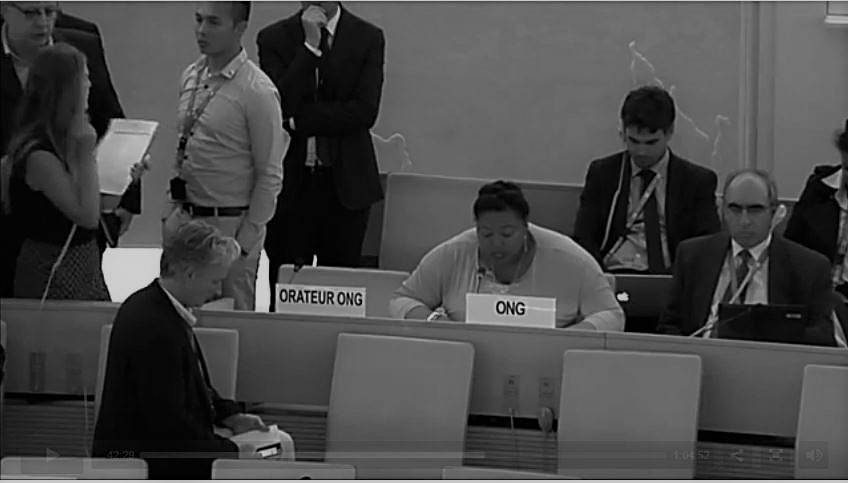
with 286 NGO signatories
The SRI also made statements on:
- Annual discussion on integration of a gender perspective
- Item 3: Interactive Dialogue with the Special Rapporteur on the Right to Development
- Item 6: Universal Periodic Review Outcomes – Brazil
- Item 6: Adopción de los Resultados del EPU – Ecuador
- Item 6: Universal Periodic Review Outcomes – India
- Item 6: Universal Periodic Review Outcomes – Indonesia
- Item 6: Universal Periodic Review Outcomes – Poland
- Item 6: Universal Periodic Review Outcomes – South Africa
- Item 6: Universal Periodic Review Outcomes – The Netherlands
- Item 6: Universal Periodic Review Outcomes – United Kingdom
- Panel discussion on the impact of multiple and intersecting forms of discrimination and violence in the context of racism, racial discrimination, xenophobia and related intolerance on the full enjoyment of all human rights by women and girls
Side Events
We Persist: Using human rights law and standards to advance the right to access safe and legal abortion
In support of the September 28 Global Day of Action for Access to Safe and Legal Abortion, the Sexual Rights Initiative organised a panel highlighting the ways in which States, civil society, the UN system, and others can use human rights law and standards to advance the right to access safe and legal abortion. It is intended that this exchange of practices and experiences will inspire further action and collaboration among States, development partners, and civil society towards realizing abortion related rights for all.
Moderator
Naureen Shameem, Challenging Fundamentalisms Human Rights Coordinator, AWID
Speakers
H.E. Martha Maurás Perez, Ambassador, Permanent Mission of Chile to the UN Ronald Johnson, Scientist, Department of Reproductive Health and Research, WHO
Dr. Tlaleng Mofokeng, Vice Chairperson, Sexual and Reproductive Justice Coalition, South Africa
Dr. Francelina Romao, Health Counselor Permanent Mission of Mozambique to the UN
Co-Sponsors
Sexual Rights Initiative, AWID, Permanent Mission of Chile to the UN, Center for Reproductive Rights, RFSU, Sexual and Reproductive Justice Coalition, World Health Organization
Panels
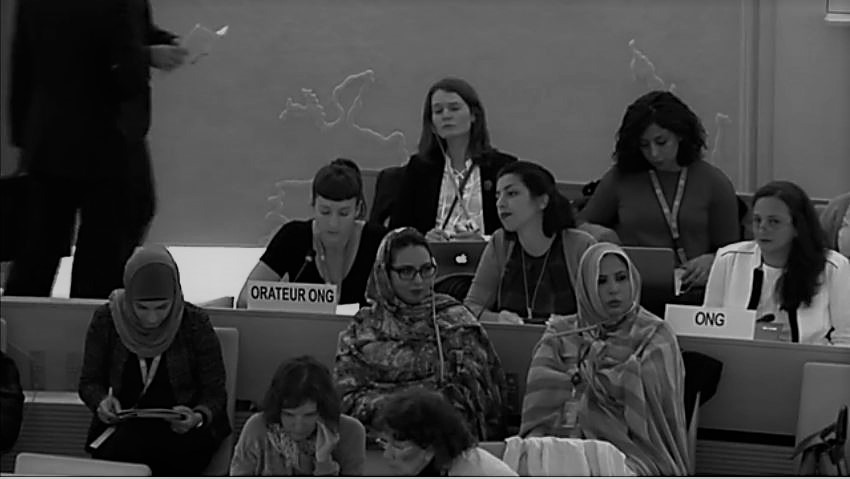
The universal periodic review and the 2030 Agenda for Sustainable Development: achieve gender equality and empower all women and girlsSRI statement begins at 2:18:31
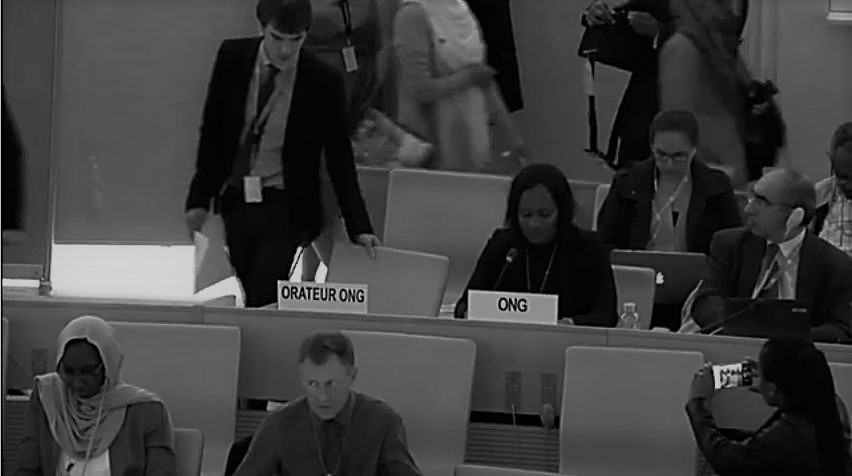
SRI statement begins at 1:29:27